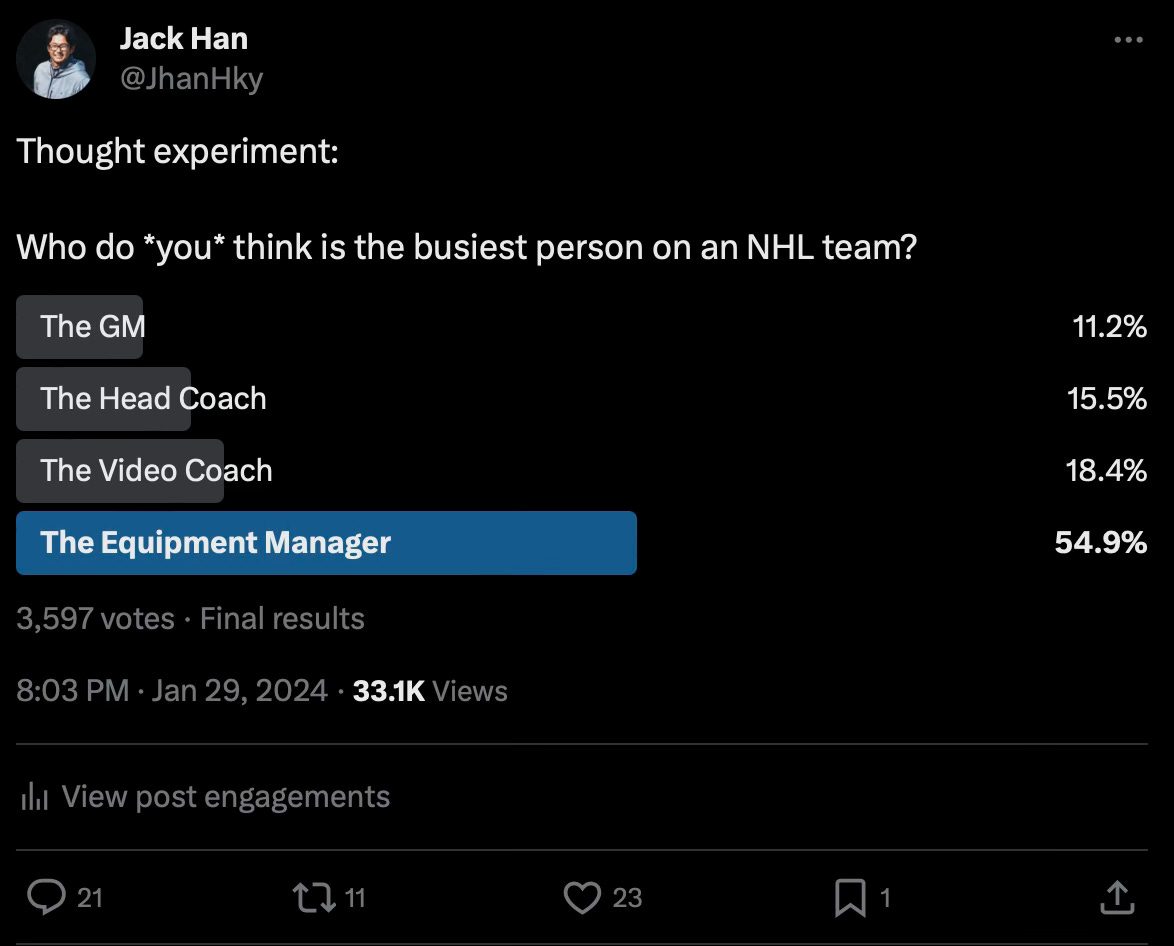Who do you think is the busiest person on an NHL team?
Here’s what my Twitter followers answered when I gave them a choice between four key positions:
Having worked in and around pro hockey for a decade now, I would broadly agree with the poll result.
So why is it that the busier the person, the less money they tend to make? (Assuming that the GM makes around $5 million, the head coach $3 million, the video coach $120,000 and the EQM under $100,000)
Perhaps it’s high supply (candidates) versus low demand (job openings).
Of maybe there is an element of unfairness and exploitation at play.
But as in many other industries, I think this inverse relationship between busy-ness and compensation is more a feature than it is a bug.
Which is to say, one should expect to become less busy, in the traditional sense, as they move up the echelon. To go a step further, un-busy-ing one’s self might even be essential if a person is looking to move up the corporate ladder.
I think it comes down to ambiguity and leverage, which add up to a person’s level of responsibility for the final outcome.
Take the difference between:
A technician charged with repairing a set of traffic lights
An supervisor sitting in the control room of a city’s traffic light grid
The engineer who designed the aforementioned grid
We go from low ambiguity +low leverage (the technician can refer to a manual and only repairs one set of lights at a time), medium ambiguity + medium leverage (the supervisor has a clear idea of what “all good” looks like across the city and can act on a broad scale if need be) to high ambiguity + high leverage (the engineer is uncertain of city X’s particularities until he starts working, but once he makes a breakthrough he can extend the solution across the world).
It is now less surprising that systems engineers are paid a higher premium for their expertise. Even when they are doing absolutely nothing. It’s a sign that the system works.
There is a clear obstacle to a person’s ability to operate inside ambiguity as well as their capacity for using leverage.
That obstacle is busy-ness.
Due to the nature of their job, an NHL GM is far better off working just a few hours most days but 20+ hours a day in specific high-leverage moments, rather than 9AM-5PM every day. Getting there may mean cutting out unnecessary travel and meetings to focus on ad-hoc tasks (trades, signings, hirings, etc.). Having slack in their system makes them more responsive to potential competitive advantages.
An NHL head coach’s most important attribute is the ability to delegate. Being intelligently lazy and having assistants, analysts and even chauffeurs take on some of the grunt work allows a head coach to step back, look at the big picture and find solutions to player- and team-level challenges. “I don’t have time to talk to (this important person),” or “I don’t have time to think about (this important thing)” are not what you’d want to hear from a head coach.
Having been a video coach at the university and pro levels, I felt first-hand how routine busy-ness affected the quality of my work as well as the quality of my attitude.
Being a newsletter publisher/ebook author/player development consultant/remote coach implies far more ambiguity, as I don’t have a boss but also no mentor and no career compass. However I do also have much higher leverage. When I was in the NHL my work was used by about 25 people. Now that number is closer to 20,000. Overall I’m making more money than I did in the Toronto Maple Leafs organization while working fewer hours on average, though this number can change from week-to-week especially if there is travel involved.
Here are the key takeaways
Just because someone is making more money for less work doesn’t mean that the system is rigged - you may just be looking at things through the prism of busy-ness rather than of ambiguity and leverage
If you’re serious about moving up and 10x-ing your career, consider the importance of strategically unburdening yourself and investing in your ability to go beyond your current scope
Working really hard for many years in a given job might not actually make you qualified to take the next leap


